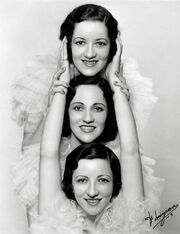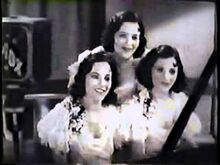No edit summary Tag: Visual edit |
Tag: Visual edit |
||
| (9 intermediate revisions by 2 users not shown) | |||
| Line 1: | Line 1: | ||
| + | [[File:Boswell Sisters.jpg|thumb]] |
||
'''The Boswell Sisters''' were an American close harmony singing trio of the [[jazz]] and swing eras, consisting of three sisters: Martha Boswell (June 9, 1905 – July 2, 1958), Connee Boswell (original name Connie, December 3, 1907 – October 11, 1976), and Helvetia "Vet" Boswell (May 20, 1911 – November 12, 1988). Hailing from uptown New Orleans, the group was noted for their intricate harmonies and rhythmic experimentation. They attained national prominence in the United States in the 1930s during the twilight years of the Jazz Age and the onset of the Great Depression. |
'''The Boswell Sisters''' were an American close harmony singing trio of the [[jazz]] and swing eras, consisting of three sisters: Martha Boswell (June 9, 1905 – July 2, 1958), Connee Boswell (original name Connie, December 3, 1907 – October 11, 1976), and Helvetia "Vet" Boswell (May 20, 1911 – November 12, 1988). Hailing from uptown New Orleans, the group was noted for their intricate harmonies and rhythmic experimentation. They attained national prominence in the United States in the 1930s during the twilight years of the Jazz Age and the onset of the Great Depression. |
||
When the trio formally split in 1936, Connie continued as a solo vocalist in radio, film, and later television for an additional quarter of a century. The trio's "unique singing style and ground-breaking arrangements fused 'blackness' and 'whiteness' in music," and their collaborations with "the preeminent white swing musicians of their day—the [[Dorsey Brothers]], [[Glenn Miller]], [[Benny Goodman]], [[Artie Shaw]]—had a profound effect on the development of the big band sound in the 1930s." When assessing their legacy, scholars claim the Boswell Sisters "made 'real' jazz commercially viable, destigmatizing the music and opening its appreciation to the wider American public." |
When the trio formally split in 1936, Connie continued as a solo vocalist in radio, film, and later television for an additional quarter of a century. The trio's "unique singing style and ground-breaking arrangements fused 'blackness' and 'whiteness' in music," and their collaborations with "the preeminent white swing musicians of their day—the [[Dorsey Brothers]], [[Glenn Miller]], [[Benny Goodman]], [[Artie Shaw]]—had a profound effect on the development of the big band sound in the 1930s." When assessing their legacy, scholars claim the Boswell Sisters "made 'real' jazz commercially viable, destigmatizing the music and opening its appreciation to the wider American public." |
||
| + | |||
(Read more at [https://en.wikipedia.org/wiki/The_Boswell_Sisters Wikipedia)] |
(Read more at [https://en.wikipedia.org/wiki/The_Boswell_Sisters Wikipedia)] |
||
== Links to Peel == |
== Links to Peel == |
||
| − | Peel would have been aware of the Boswell Sisters due to his youthful interest in [[jazz]]. (They also recorded |
+ | Peel would have been aware of the Boswell Sisters due to his youthful interest in [[jazz]]. (They also recorded a song called "Rock And Roll" in 1934.) Their records were reissued on LP and played on BBC jazz and nostalgia shows, such as those hosted by [[Alan Dell]] and [[Hubert Gregg]] as well as on the long-running [[BBC Radio Two|Radio Two]] series on popular song history, presented by [[Benny Green]] and, after Green's death, by [[Russell Davies]]. |
| + | |||
| + | JP played a track by them in 1976, to draw attention to the 50th anniversary of [[Melody Maker]]. This was a time when he and producer [[John Walters]] were including 1930s records in Peel show playlists and from then on the DJ revisited their work from time to time - although he didn't pay attention to the various female vocal groups which the "Bozzies" inspired. Their twenty-first century fans included [[Laura Cantrell]], and in 2002 Peel played a track from a Boswell Sisters collection which she had compiled and which had not been commercially released. |
||
| + | |||
| + | == Shows Played== |
||
| + | |||
| + | [[File:The Boswell Sisters - Crazy People 1932|thumb|220x220px]] |
||
| + | |||
| + | ;1976 |
||
| + | |||
| + | *[[19 March 1976]]: Crazy People |
||
| + | |||
| + | ;1983 |
||
| + | |||
| + | *[[10 May 1983]]: We've Got To Put That Sun Back in the Sky |
||
| + | |||
| + | ;2001 |
||
| + | |||
| + | *[[27 February 2001]]: Lawd, You Made The Night Too Long (v/a CD - 1927-1946 - Heartbreakers: Blue & Lonely) Trikont |
||
| + | |||
| + | ;2002 |
||
| + | |||
| + | *[[19 February 2002]]: Shout Sister Shout (LP - Shout Sister, Shout) white label |
||
| − | == |
+ | ==External Links== |
| ⚫ | |||
| ⚫ | |||
| ⚫ | |||
| + | *[https://www.discogs.com/artist/307205-The-Boswell-Sisters Discogs] |
||
| ⚫ | |||
| + | [[Category:Artists]] |
||
Latest revision as of 14:12, 1 April 2021

The Boswell Sisters were an American close harmony singing trio of the jazz and swing eras, consisting of three sisters: Martha Boswell (June 9, 1905 – July 2, 1958), Connee Boswell (original name Connie, December 3, 1907 – October 11, 1976), and Helvetia "Vet" Boswell (May 20, 1911 – November 12, 1988). Hailing from uptown New Orleans, the group was noted for their intricate harmonies and rhythmic experimentation. They attained national prominence in the United States in the 1930s during the twilight years of the Jazz Age and the onset of the Great Depression.
When the trio formally split in 1936, Connie continued as a solo vocalist in radio, film, and later television for an additional quarter of a century. The trio's "unique singing style and ground-breaking arrangements fused 'blackness' and 'whiteness' in music," and their collaborations with "the preeminent white swing musicians of their day—the Dorsey Brothers, Glenn Miller, Benny Goodman, Artie Shaw—had a profound effect on the development of the big band sound in the 1930s." When assessing their legacy, scholars claim the Boswell Sisters "made 'real' jazz commercially viable, destigmatizing the music and opening its appreciation to the wider American public."
(Read more at Wikipedia)
Links to Peel
Peel would have been aware of the Boswell Sisters due to his youthful interest in jazz. (They also recorded a song called "Rock And Roll" in 1934.) Their records were reissued on LP and played on BBC jazz and nostalgia shows, such as those hosted by Alan Dell and Hubert Gregg as well as on the long-running Radio Two series on popular song history, presented by Benny Green and, after Green's death, by Russell Davies.
JP played a track by them in 1976, to draw attention to the 50th anniversary of Melody Maker. This was a time when he and producer John Walters were including 1930s records in Peel show playlists and from then on the DJ revisited their work from time to time - although he didn't pay attention to the various female vocal groups which the "Bozzies" inspired. Their twenty-first century fans included Laura Cantrell, and in 2002 Peel played a track from a Boswell Sisters collection which she had compiled and which had not been commercially released.
Shows Played

The Boswell Sisters - Crazy People 1932
- 1976
- 19 March 1976: Crazy People
- 1983
- 10 May 1983: We've Got To Put That Sun Back in the Sky
- 2001
- 27 February 2001: Lawd, You Made The Night Too Long (v/a CD - 1927-1946 - Heartbreakers: Blue & Lonely) Trikont
- 2002
- 19 February 2002: Shout Sister Shout (LP - Shout Sister, Shout) white label